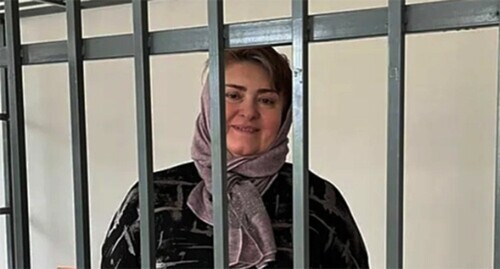Human rights defenders point out lack of FSIN’s interest in medical treatment of Zarema Musaeva
The delay in hospitalizing Zarema Musaeva fits into the practice of treating prisoners accepted in institutions of the Federal Penitentiary Service (known as FSIN). The FSIN is not interested in providing medical treatment for prisoners, human rights defenders emphasize.
The “Caucasian Knot” has reported that on June 27, the Shali District Court for the second time dismissed the motion requesting conditional early relief for Zarema Musaeva. The court justified the refusal by the fact that the woman did not compensate for the damage in the case on fraud and was put on the preventive registration list at the penal colony. On September 27, advocate Alexander Savin reported that the Zarema Musaeva’s blood sugar approached a critically high level, drug therapy in a penal colony was not able to help the woman, and the court postponed for a month the consideration of the appeal against the refusal in the conditional early relief (CER) for Zarema Musaeva.
It is very difficult to get proper medical care in penal colonies and prisons, notes human rights defender Sergey Babinets.
“We see the example of Zarema Musaeva proves that. If no appropriate medical officers are available, a person is to be sent to hospital, but first he or she go through a lot of bureaucratic formalities that can drag on for several days and even weeks. And a person for whom it is critically important to receive help may never get it,” Sergey Babinets explained.
The human rights defender notes that in practice, cases when sick prisoners are released are rare. “In my practice, there have been cases when people died in penal colonies without receiving medical help,” Sergey Babinets emphasized.
A human rights defender from Northern Caucasus believes that no one is interested in providing medical treatment for Zarema Musaeva.
“They hold her hostage knowing they will not be punished for that. Most of those who have served their sentences in penal colonies in Russia come out of there crippled or with a bunch of diseases,” the human rights defender stated.
He suggests that there are no employees in penal colonies who are ready to provide timely medical care to prisoners who need it, as “for warders, the only thing that matters is ‘to break’ a person.”
As of January 31, 2020, there were 519.600 people kept in places of detention in Russia. During the year of 2019, 2420 prisoners died.
The “Caucasian Knot” has reported that Kirill Buzmakov, one of the defendants in a case on preparation to set fire to a military registration and enlistment office in Pyatigorsk, died at home in the summer of 2024. The man was released from a SIZO (pre-trial prison) in severe condition. Kirill Buzmakov wrote to his friend that his illness was caused by torture and absence of medical treatment.
In 2018, Yusup Temirkhanov, who had been sentenced for killing former Colonel Yuri Budanov, died in a hospital in Omsk, where he was transferred because of an exacerbation of his chronic diseases.
This article was originally published on the Russian page of 24/7 Internet agency ‘Caucasian Knot’ on September 30, 2024 at 02:00 am MSK. To access the full text of the article, click here.
Source: СK correspondent





![Tumso Abdurakhmanov. Screenshot from video posted by Abu-Saddam Shishani [LIVE] http://www.youtube.com/watch?v=mIR3s7AB0Uw Tumso Abdurakhmanov. Screenshot from video posted by Abu-Saddam Shishani [LIVE] http://www.youtube.com/watch?v=mIR3s7AB0Uw](/system/uploads/article_image/image/0001/18460/main_image_Tumso.jpg)